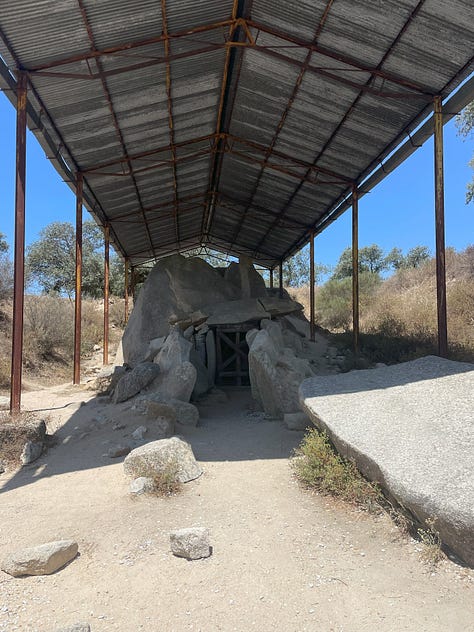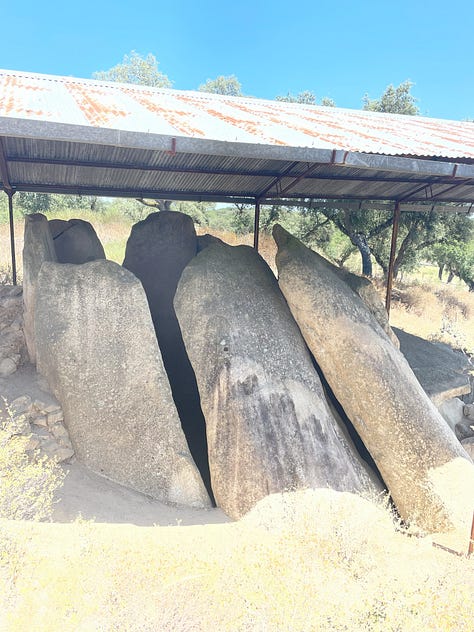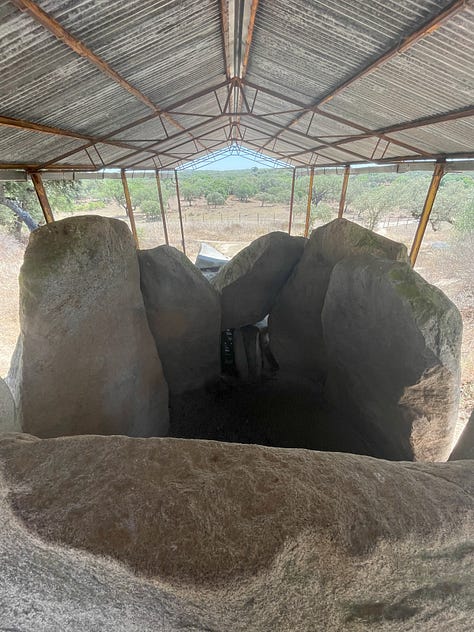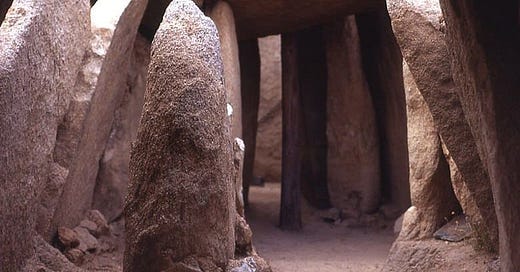Deus Pater, Dea Mater
Did you know the word for God in many Indo-European languages—deus in Latin, devás in Vedic, día in Old Irish, dievas in Lithuanian—once meant ‘shine’?
Those elusive ancestors of the cross-continental cultures we know today as many different peoples once looked up to the sky shining with light and saw irrefutable power, something to be revered and feared.
As this ‘shining’ (from the root *dyew-) bound itself with the light of day—or the winking light of nightly stars—it took on another shade of meaning: sky, or heaven. Much like German’s Himmel does not differentiate between heaven and sky, long ago the Proto-Indo-Europeans gazed up at both a heaven and a sky.
In my divided, modern mind, I wonder which, truly, came first: a word to describe the physical aspects of photons streaking across the aether, or a recognition of divinity in that celestial gleam, same as how consciousness alights in the eye of a living being. Perhaps neither. Or rather, both. To gaze upon any light, whether it be the sunlight or the stars, was to know a god. It is not a coincidence, after all, that the PIE root *weyd- ‘to see’ developed the significance ‘to know’ in many daughter languages. Thus, the root *dyew-, that glittering firmament, was god.
Later (how much later cannot be well ascertained behind the veil of prehistory), this *dyew- ‘god,’ ascended cosmic supremacy, perhaps around the same time as a patriarchal system was established in society, and accepted the title of *ph₂tḗr, ‘father.’ Not, in our limited modern view, merely to suggest paternity of the universe (which, after all, included many other productive agents), but to establish the head of a family, much like the Ancient Roman pater familias.
As the Indo-Europeans branched off and spread throughout the far reaches of Europe and Asia, they took this Father Sky with them, imposing both a patriarchal religion and society upon those even more mysterious ‘indigenous’ civilizations, theorized to be matriarchal. But these cultures left their mark, not just genetically through forced, gradual intermarrying, but also in religion. Almost all daughter languages have a ‘Mother Earth’ (a concept not restricted to these cultures but found all over the world), yet it is difficult to trace the name of such a goddess back to a specific PIE root. Still, we find in archeological digs countless Mother figurines—symbols of fertility and earth, we guess—and massive womb-shaped tombs that suggest these people worshipped a goddess.
I saw one of these womb-shaped tombs in Évora, Portugal, the Great Dolmen of Zambujeiro. Over time, those monolithic stone slabs were overgrown with grass and appeared as a large hill in the landscape for centuries and centuries. Archaeologists and tourists have beaten dirt from the stones underfoot, and the tomb resurfaced—surely before it had been meant to—for us to wonder at its significance.
The dead were buried inside in the fetal position alongside objects necessary for daily life—ceramic, jewelry, weapons, sewing materials, and the like—preparations for the journey ahead. The opening of the womb-shaped tomb faced the east and the rising sun, but also where the first full moon after the spring equinox appears on the horizon during the moon’s metonic cycle. Clearly, they believed in an afterlife, maybe even rebirth, the soul’s ability to traverse the Land of the Dead and ascend once more.



Later (again, allow me to brush aside millennia and tenuous evidence with this one word), a reluctant partnership seems to have arisen between Father Sky and Mother Earth. In Ancient Greece, for example, we see various iterations of this cosmic marriage in Ouranos and Gaia, Cronos and Rhea, Zeus and Demeter. Thus, modern science confirms what the ancients already knew: photons and oxygen swirling in the shining sky marry with plants and animals bound on Earth to create life.
As earth-bound creatures, our lingering worship of Mother Earth in the face of the powerful Father Sky should not come as a surprise. One may gaze at the sky and trace patterns of Fate across the shining stars, but it is to the bosom of the earth we shall ultimately return.
Autorae Epistula
I have decided to try something new: blend my author website’s newsletter with my personal blog, MEDITERRA, here on Substack. From now on, my goal is to send out reflective pieces on writing, books, Tolkien, Classics, language, and more, while also including author updates, personal news, what I’m reading, and quotes that I included in my other newsletter.
The website newsletter, on the other hand, will be reserved for those who want explicit updates about new book releases, interviews, discounts, and other relevant author information, rather than regular updates or blog posts. I hope you enjoy this new phase of MEDITERRA as my Autorae Epistula, or ‘Author’s Letter’!
FROM THE WRITER’S DESK:
Currently, I am writing the third book of my ancient Mediterranean mythology-inspired portal fantasy series, The Realm of Emmeson, and I’ve enjoyed the amount of research going into this one. My interests in Ancient Greek and Egyptian myth, their eventual mingling and cross-breeding in the ancient city of Alexandria, and the related Hermetic and gnostic philosophies entangled with the mysterious study of alchemy, which could only have been produced in such an intellectual, cosmopolitan scene steeped in a long, solemn religious history.
Each novel in this series has brought out a different atmosphere—The Song of Gaia sought inward, both in the main character, Alexandria, and the city she discovers; The Pillars of the Sea explored outward, traversing the realm of Emmeson through familiar and new landscapes of Homeric and Egyptian mythology; lastly, the third book will turn intellectual and mystical at the same time as it extends the quick-paced, action-packed storyline of the second book into the culmination of the illusive prophecy.
NEW RELEASES:
CURRENT PROJECTS:
BOOK 3 REALM OF EMMESON - First draft
SOFIA BEFORE LOVE (a book of poetry) - Illustrations
WHAT I’M READING:
Iliad by Homer (in Ancient Greek!)
The Gnostic by Jacques Lacarrière
Lyra Mystica by Charles Albertson
IN OTHER NEWS:
I recently visited San Fransico and went to City Lights Bookstore. Usually, I prefer used bookstores, but I found an intriguing copy actually printed by the bookstore, which I could not resist buying, if only as a memento of my visit:
My other Substack, The Fellowship of the Readers, will start slow-reading The Silmarillion on July 29th. Check it out if you are interested in reading or just following along with the occasional quote excerpts I’ll send out to mark our journey!
A QUOTE:
“When we die, like rain-drops falling back again into the sea, we fall back into the big, shimmering sea of unorganised life which we call God. We are lost as individuals, yet we count in the whole. It requires a lot of pain and courage to come to discover one’s own creed, and quite as much to continue in lonely faith.”
—D.H. Lawrence in a letter to his sister, Ada Lawrence, on April 9, 1911
MY BOOKS
The Sun of God — an epic historical novel set in Ancient Rome
(Amazon, discount paperback, discount special edition hardcover, audiobook)
Imagining the Roman Empire: Essays on Travel & Antiquity in the Mediterranean
(Amazon paperback)
The Realm of Emmeson trilogy:
The Song of Gaia (Book #1)
(Amazon, discount paperback, discount hardcover, special dust jacket hardcover)
The Pillars of the Sea (Book #2)
(Amazon, discount paperback, discount hardcover)
Hilltop High series - YA queer romance:
My Sister’s Best Friend (Book #1)
(Amazon, discount paperback, audiobook)
Best Friends & Their Exes (Book #2)
(Amazon, discount paperback, audiobook)
MY PODCAST
Hot takes on the ancient world by two Classics students and dead language fanatics!
Listen to our new episode:
“WORD You Rather: Germanic vs Romance Descendants in English”
Find it on Spotify, Apple Podcasts, and most other podcast streaming services!









What a fantastic essay! In the past there was a lot of anthropomorphizing of the gods. Interesting to note, both Father Sky and Mother Earth, while glorious and full of bounty, could also get very angry. One thing for sure, modernity could not shake the everlasting mystery surround both of them!